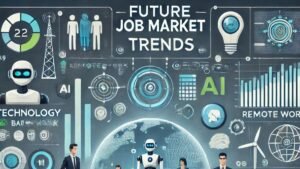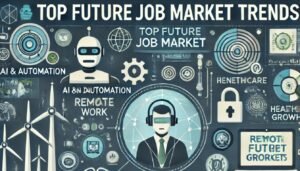The global job market is rapidly changing, driven by technological advancements, globalization, and shifting economic priorities. As we approach 2025 and beyond, individuals must understand emerging trends and adapt their careers to remain competitive. This guide explores future job market trends, why they matter, how to align your skills, and strategies to future-proof your career.
What are Future Job Market Trends?
Future job market trends are patterns and predictions that reveal the evolving employment landscape. These trends help professionals understand which industries, roles, and skills will likely grow in demand.

Key Factors Influencing Job Market Trends:
- Technology and Automation: AI, robotics, and machine learning are reshaping industries.
- Remote and Hybrid Work Models: Flexible work arrangements are becoming standard.
- Sustainability and Green Economy: Focus on environmentally conscious jobs.
- Globalization: International collaboration and outsourcing are expanding.
- Demographic Shifts: Aging populations and diverse workforces influence job availability.
Why Do Job Market Trends Matter?
Understanding job market trends is essential for professionals, students, and businesses because:
- Career Planning: It helps individuals align their goals with emerging opportunities.
- Skill Development: Knowing future skills in demand allows for targeted upskilling.
- Business Strategy: Companies can anticipate workforce needs and invest in talent.
- Economic Growth: Future trends guide government policies and educational reforms.
Top Future Job Market Trends 
1. Technology-Driven Roles
The rise of automation and AI is creating a demand for tech-savvy professionals. Some high-growth areas include:
- AI and Machine Learning Specialists
- Data Analysts and Scientists
- Cybersecurity Experts
- Software Developers
2. Healthcare Expansion
With aging populations and advancements in medical technology, the healthcare industry is booming. Roles such as telehealth coordinators, genetic counselors, and elder care specialists are in demand.
3. Sustainability and Green Jobs
The green economy is gaining traction with roles like renewable energy engineers, environmental consultants, and sustainability managers.
4. Remote and Freelance Opportunities
The gig economy is thriving, with freelancers and remote workers filling niches in digital marketing, content creation, software development, and virtual assistance.
5. Soft Skills in High Demand
Emotional intelligence, adaptability, and communication are critical as automation handles routine tasks. Leadership and creativity will differentiate professionals in competitive markets.
6. Education and Reskilling
Online learning platforms and reskilling programs are crucial for professionals adapting to new roles.
How to Align Your Career with Future Trends
1. Embrace Lifelong Learning 
Stay updated with online courses, certifications, and workshops on emerging skills. Platforms like Coursera, LinkedIn Learning, and Udemy offer excellent resources.
2. Build a Strong Digital Presence
Develop a polished and professional LinkedIn profile to effectively highlight your skills, experience, and expertise. Consider personal branding through blogs or YouTube channels.
3. Stay Tech-Savvy
Even non-technical roles require basic tech knowledge. Learn data literacy, digital marketing, or cloud computing to enhance your resume.
4. Focus on Networking
Networking remains critical. Attend industry conferences, and webinars, and join professional groups to stay informed.
5. Develop Adaptability
Adapt to changes with a growth mindset. Industries evolve, and professionals must pivot to new roles or sectors as needed.
FAQs
Q1: What industries will dominate the future job market?
Industries like technology, healthcare, renewable energy, and eCommerce are expected to grow exponentially.
Q2: How can students prepare for future careers?
Students should focus on STEM education, digital literacy, and internships in emerging industries.
Q3: Will AI take over all jobs?
AI will automate repetitive tasks but also create new opportunities in AI management, data analysis, and human-centric roles.
Q4: What is the role of sustainability in future jobs?
Sustainability is central, with governments and corporations focusing on green initiatives, creating new roles in renewable energy and environmental policy.
Q5: Is remote work here to stay?
Yes, remote and hybrid work models will remain popular as businesses value flexibility and reduced operational costs.
How to Future-Proof Your Career
- Stay Relevant: Regularly update your skills through learning programs.
- Build Resilience: Develop problem-solving and critical thinking abilities.
- Seek Mentorship: Learn from industry leaders and apply their insights to your career.
- Explore Emerging Markets: Keep an eye on trends in blockchain, IoT, and quantum computing.
- Diversify Skills: Gain experience in multiple fields to adapt to job market shifts.
Conclusion
The future job market will be shaped by technology, sustainability, and global collaboration. Individuals can secure their place in tomorrow’s workforce by staying informed about trends, focusing on continuous learning, and building adaptability. Embrace these changes as opportunities for growth and innovation, and you’ll thrive in the evolving professional landscape.
Ready to elevate your professional presence? ✨ Share your thoughts in the comments below—what’s the one thing you’ll focus on while creating your LinkedIn profile to stand out? Let’s inspire each other!

